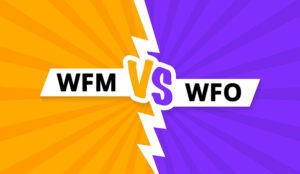A contact centre is a perfect place for a multigenerational team. There’s so much to do and so many types of customers to work with — not to mention so many channels to manage — that having a team of agents with different strengths will invigorate your customer experience.
Tapping into the capabilities of your multigenerational contact centre agents is easier than you think — all it takes is a commitment from you as the leader.
The cost of not committing is high: 61% of customers say they would defect to a competitor after just one bad experience. Making the most of your multigenerational workforce’s strengths to serve your customers better is definitely worth the effort.
What Is a Multigenerational Workforce?
A multigenerational workforce is one that has a fairly even distribution of workers across generations. The generally accepted generations are defined as:
- Generation Z: Born between 1997 and 2012 – Age in 2022: 25 and under
- Millennials: Born between 1981 and 1996 – Age in 2022: 26 to 41
- Generation X: Born between 1965 and 1980 – Age in 2022: 42 to 57
- Baby Boomers: Born between 1946 and 1964 – Age in 2022: 58 to 76
What a Multigenerational Workforce Wants by Generation
Gen Z dislikes the hierarchy that other generations tend to cling to. They want to be treated as valuable members of the team and to be brought into important conversations.
But that’s not what’s happening enough — about a third of Gen Z respondents in a 2022 Deloitte survey said decisions in their organization are made at the top and employee feedback is disregarded.
Multigenerational Workforce Challenges
In any business, it can be difficult to keep up with the different inclinations and work styles of members of the different generations.
While you don’t need to cater to their every preference, it’s helpful to know each generation’s general perspective. When you understand your agents better, you’ll create a healthier workplace for everyone.
Thanks to rapid changes in technology and society, the oldest and youngest Millennials have differing perspectives on many issues — making them trickier to understand.
On the whole, though, they all want to feel that you care about them as people first and employees second. In a Gallup survey, both younger and older Millennials ranked an organization’s interest in their well-being as the top factor they look for in an employer.
Gen X values independence above almost all else. They want to feel that you trust them to handle themselves without micromanaging them. In an Ernst & Young survey, 56% of Gen Xers said they felt most included at work when they perceived that they were respected.
While many Baby Boomers saw the pandemic as a signal to retire, many remain and some retirees are returning to the workforce.
Knowing how to make them feel valued will go a long way in building a productive working relationship. Baby Boomers respect hierarchy, are committed to hard work, and value achievement in the workplace.
While you always want to be aware of different generations’ tendencies, it’s important not to make assumptions or pigeonhole agents based on their ages.
“Innovation, insight and organizational loyalty can come from all segments of the workforce,” writes Dayle M. Smith, Ph.D., dean of the College of Business Administration at Loyola Marymount University, in the Los Angeles Business Journal.
“A manager’s primary goal is to understand and harmonize [generational] differences into an impactful company culture through listening, mutual respect, and mix-and-match exposure to the full bouquet of generational talent,” she concluded.
| Generation | Prefer to Communicate Through | Wants to Receive Feedback |
|---|---|---|
| Gen Z | Text Messaging Apps, Social Media | In real time |
| Millennials | Text Messaging Apps, Social Media, Email | Often, but they’re unlikely to ask for it |
| Gen X | Face-to-Face Meetings, Email | Directly and quickly |
| Baby Boomers | Face-to-Face Meetings, Email, Phone Calls | Regularly, in a formal setting |
Solutions that include these features are more scalable, so you can bring on agents as fast as you need to or rapidly train agents on a new product or service as the need arises. They also help you train agents when they’re working remotely.
Couple that multimedia learning with role-play training for maximum effectiveness. Baby Boomers love building relationships and Gen Z and Millennials want to feel valued and important in the workplace. Try matching a new Baby Boomer agent with a younger colleague with more contact centre experience to help them both grow and feel engaged.
Agents from all generations enjoy learning from their colleagues. In the 2022 The State of Remote Work in the Contact Center Industry survey, agents ranked it as their top way to learn.
Learning alongside another agent after going through your training reinforces what your newer agents have learned and helps them better see how to apply it in a real-life situation.
Motivation
When it comes to motivating your multigenerational team, first keep an eye out for signs of demotivation:
- Reduced productivity
- Disruptive behavior
- Increasing absenteeism
- No interest in developing skills
As a contact centre leader, it’s your job to make sure these indicators of demotivation don’t creep into your team.
Keeping agents of any generation motivated starts by keeping them engaged. According to Gallup, which studies employee engagement extensively each year, there are five key drivers of engagement at work:
- Purpose
- Development
- A caring manager
- Ongoing conversations
- A focus on strengths
All these engagement drivers depend on you to develop and nurture them in your contact centre. Try tactics like:
- Give agents the option to work remotely. Being able to work remotely was the number one motivator listed by agents in The State of Remote Work in the Contact Center Industry survey — listen to them. There’s no reason most contact centres can’t offer this option — especially with the integrated remote workforce solutions available today.
- Have more frequent feedback sessions with your agents and offer ways for them to give you feedback too. All generations will appreciate hearing more frequent feedback — instead of being surprised by it in an annual review.
- Include time to chat personally about your agents’ lives when you have one-on-one meetings. This will help show them that you do care about their well-being — which is especially important to Gen Z and Millennials.
- Focus on team-building activities with your multigenerational workforce so agents can feel a sense of belonging as a group. A little healthy competition through gamified learning always helps. Baby Boomers love competition and achievement, so gamification is a great way to boost their engagement.
- Come up with group goals to achieve and give agents a sense of purpose that their work affects outcomes for the company. But don’t forget to reward their efforts directly as well. Cash bonuses, lunches out with the boss, paid time off, and tickets to experiences are all great motivators.
But you don’t have to go it alone — with the right workforce engagement management solution in place, you can manage and address all the top engagement drivers.
Turning Your Multigenerational Workforce Into a Competitive Advantage
When you have more generations represented in your workplace, you have a lot more resources you can use to better serve your customers.
Baby Boomers are more generally comfortable on the phone than in other channels like chat or social media. Focus members of this generation on phone interactions to make the most of their knack for relationship-building.
Gen Xers are good in teams: In one survey, more than two-thirds (69%) of Gen X respondents demonstrated being solid collaborators and skilled at breaking down silos in an organization. Their ability to bridge communication gaps and show empathy makes them prime candidates for handling difficult interactions.
Millennials and Gen Z are digital natives and often excellent multitaskers, which makes them fantastic for interacting with customers in channels like chat, social media, or text. Serving customers in these channels means one agent can manage more than one conversation at a time — perfect for younger agents.
Don’t let generational differences get in the way of contact centre excellence. Strive to understand your agents through honest communication and to find ways to put their strengths to best use. You’ll find yourself with a more engaged team and happier customers.
Author: Guest Author
Published On: 9th Aug 2022
Read more about - Guest Blogs, Playvox















